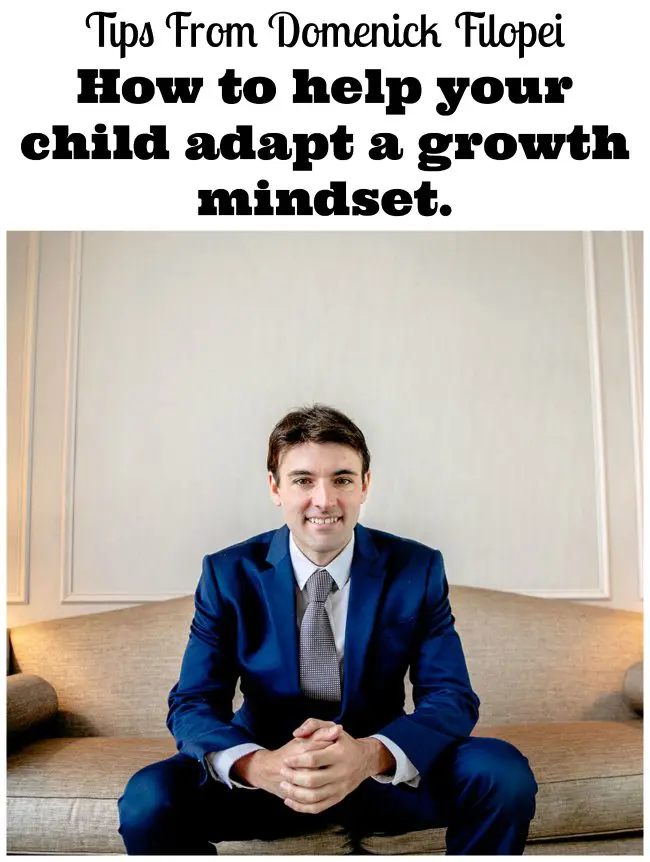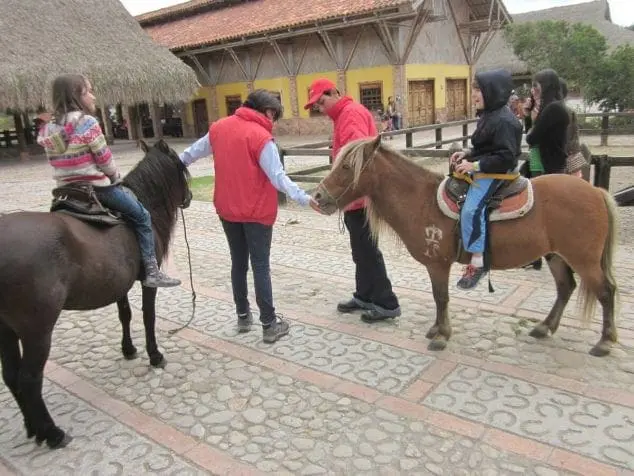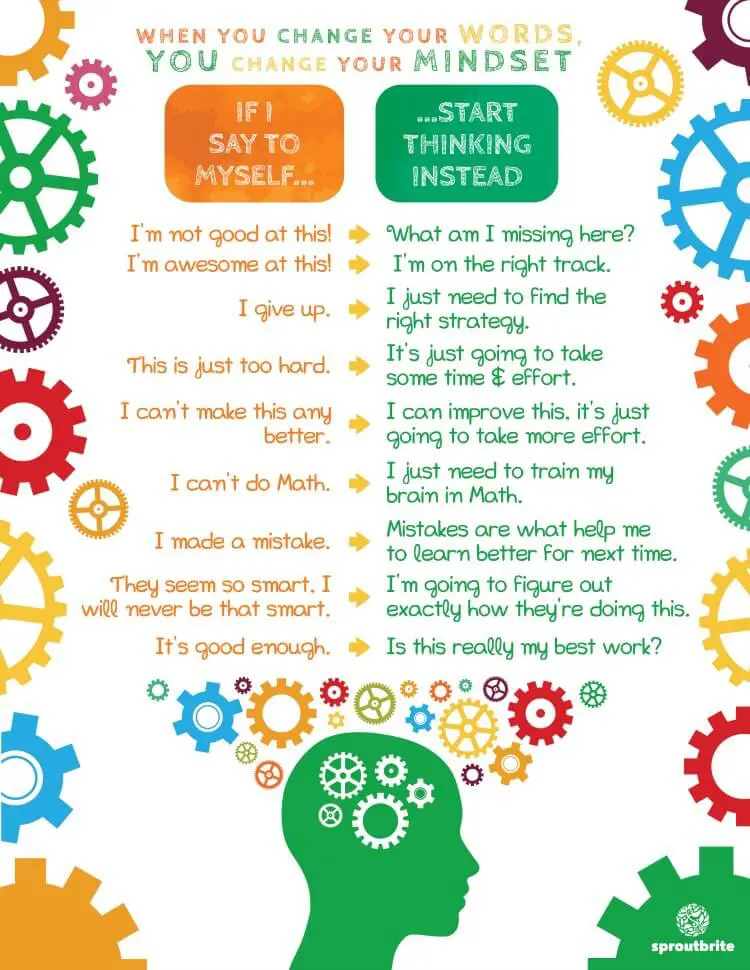Few books have as much of a direct impact on a person’s thought process as does Dr. Carol Dweck’s, Mindset. I know when I read it, I found it useful for changing my own outlook on life. Adopting the growth mindset helps us to embrace hard work and new things as an opportunity for improvement rather than as proof of lack of ability and fearing failure.The author of Mindset also inspired me as a parent to beware of the words I was using with my children. We should all want to encourage a growth mindset for kids. This blog post with share how to help kids adopt a growth mindset and encourage kids to see challenges as opportunities. Also included is a free growth mindset positive self talk printable.
I recently came into contact with Domenick Filopei, musical artist and the founder of Sproutbrite, a company that believes in making every day a little brighter than the last. He believes the growth mindset for kids is one of the most important things parents need to be aware of to help their children have the best chance to create a thriving and fulfilling life for themselves as an adult. Today, I am happy to have him share with us suggestions for helping children to adopt a growth mindset.
Understanding The Growth Mindset For Children
By Domenick Filopei
Do you remember as a child how many dreams and aspirations you had? Do you remember a time when you felt anything was possible?
Along the way, our societal norms changed us and the “real world” crept in. We experienced failures, or disappointments and hard things just got harder. While life was never meant to be easy, our mindset determines how we tackle the difficulties life throws our way. A positive mindset helps us embrace the learning process in a meaningful way that leads to greater happiness and positive results.
A person’s mindset consists of their attitudes, way of thinking, inner self talk, and their opinions about the world around them. Mindset is developed in children from a very young age. In the case of adults, can be shifted with effort and self-reflection.
Growth Mindset Vs Fixed Mindset For Kids
Dr. Carol Dweck, a researcher from Stanford University, introduced the world to two very important types of mindsets: fixed mindset and growth mindset. Here is my affiliate link to her book on Amazon. She states that the right mindset plays a major factor in our development from children to adult.
Throughout history, it has been perceived that people are born with a certain amount of intelligence level. Intelligence Quotient (IQ) is the main metric in determining a person’s intelligence.
IQ is a great starting point. However, thanks to neuroscience and research from Stanford psychologist Carol Dweck & others, we now know intelligence is not fixed. Intelligence can be developed & enhanced in the same way you teach a child to play sports.
What is a fixed mindset?
A person with a fixed mindset believes that intelligence & talent alone leads to success. They believe intelligence and basic abilities cannot be changed. They believe people are born either smart & talented or they are not.
People with a fixed mindset often try to appear intelligent because they fear looking stupid among peers. They also fear other people will judge them. Because of this, they prefer an easy task and a good grade. It is safer than working on a new skill or stepping out of their comfort zone.
Fixed beliefs about themselves and others hold them back from growing. It’s harder for fixed mindset people to adapt in a fast changing world. Students’ mindsets in middle school can propel them forward to face new challenges or place them on a safe track where they only use natural talent.
What is growth mindset for kids?
A person with a growth mindset believes their basic abilities, intelligence, and talents can be developed with effort, learning, and persistence. Their abilities are a starting point. They don’t believe everyone is the same, but they understand that people can get smarter, faster, & stronger if they train properly.
They know that the brain is a muscle. Like all muscles in your body, consistent training makes it stronger. They understand that they won’t always know the right strategies the first time. The important thing is the love of learning. They know that the next time, they will find more effective ways and improve their own abilities.
Growth mindset definition for kids: A growth mindset means believing that you can get better at something with effort, practice, and learning. Kids with a growth mindset understand that mistakes help them learn, and they don’t give up just because something is hard. Instead, they keep trying, ask for help, and find new ways to solve problems.
Why is a fixed mindset detrimental to children?
A fixed mindset is when someone believes that their abilities, intelligence, or talents can’t change—they think they are either “good” or “bad” at something and that effort won’t make a difference.
Children with a fixed mindset are more likely to:
- Fear failure
- Have negative thoughts about themselves and others
- Give up on things they feel are too difficult to complete
- Ignore feedback from their peers
- Avoid risks
- Feel threatened by the success of people around them
- Have beliefs that are inflexible
Why is mindset change to growth better?
Children with a growth mindset are more likely to:
- Learn from past mistakes & see failure as an opportunity to grow
- Develop motivation to succeed
- Use positive self-talk
- Put more effort into everything they do in life
- Tackle challenging tasks head on
- Take risks
- Understand that a great performance may require a lot of practice
- Seek feedback and see it as a way for them improve
- Learn more information and retain it faster
With a growth mindset, kids learn that challenges help them grow, and effort leads to progress.
It’s not possible to have a growth mindset at all times in life. But when it comes to the balance, here are ten common thought patterns. These will help you recognize if you and your children lean more towards a fixed mindset or a growth mindset. See below image. The left side is a fixed way of thinking while the right is a growth way of thinking. These small changes can have a big impact!
Download this chart and hang it on the refrigerator of your house. It also makes a great handout on growth mindset for elementary students. Creating a child with growth mindset starts with daily reminders and action. Kids of all ages will begin to develop the power of growth mindset when they are exposed to the idea that challenges can be a fun way to accomplish amazing things.
What are some ways to help children adapt a growth mindset?
Are you wondering how to have a growth mindset? Well, remember, mindset change is a process. It begins with a desire and and understanding of the mindsets. Then is a gradual choice you make as the situations arise. As a parent you can watch the way you talk to your child to be sure you are encouraging a growth mindset. Instead of praising their natural talent, praise effort and positive outlook to reach their full potential.
Communication about failure & mistakes
Communication is a key to life. Talk to your children about their day. Guide the conversation by asking questions like:
What mistakes did you make today? What did you learn from those mistakes?
If your child does not proactively learn from mistakes, help them start.
Mistakes and failures are as important as successes are. Failure builds character and makes them stronger. This will also help them develop grit. Grit is the combination of perseverance and consistent work ethic. Your child will eventually learn not to fear failure. They will learn to persevere with challenges as they learn to have a growth mindset. Accepting the concept of growth mindset will help your child be in pursuit of the best version of themselves.
Growth Mindset Activities For Kids
All people need to be challenged to grow especially children. Encouraging your child to try difficult tasks encourages them to think, adapt, and become at ease with challenging circumstances. Life is ultimately a series of challenges that will require different strategies to overcome each hurdle.
Encouraging growth mindset activities for kids really just translates into encouraging them to try difficult tasks. Then praise them for their effort as they work to improve. These growth mindset activities can be sports, academics, or extra curricular activities- anything that offers them a new challenge.
They may want to try this exercise:
Pick one area where you would like to have more of a growth mindset. Then pick one actionable area to see how much you can improve in one week with effort and practice. For example, if you would like to have more of a growth mindset towards art work, pick one subject you will work on drawing each day of the week. Watch some tutorials, look at some examples, and try 10 times each day to improve each day. Save your attempts each day and look at your progress from your first day to your seventh day. Allow this experience to inspire you to see that your potential grows the more you try.
Praise the process not the person
Instead of telling your children, “You are great,” “You are really smart” saying something like, “Wow, it looks like you worked really hard on this.” This gives your child a chance to self-validate themselves instead of leaning on you to validate their actions. Self-validation is important for a child to develop their own opinions and ideas. The right kind of praise leads to higher self-esteem that is not threatened by lack of success.
Their brains can grow!!
Remind your children often that their brains grow like everything else in their body. Things that seem hard at first become easier with effort and practice because the brain develops new neuron connections. If they don’t know or believe this is possible, their missing one of the most important things in developing a growth mindset. They will eventually become capable of performing difficult tasks because they understand their brain needs training to accomplish difficult tasks.
Self-talk
The way people talk to themselves internally has a huge impact on the things they do, the decisions they make & the perception they develop about life. A habit of negative self-talk from a young age continues into teenage and adult years. Changing internal self-talk will change how see their place in life. As a parent, learning to model a growth mindset yourself is the best way to teach your child to adapt a growth mindset. It will also have a huge impact on your own life.
Conclusion
As individuals, each of us is different. Though we may naturally lean towards a growth mindset or a fixed mindset, the thoughts we choose can affect this. You may find that in some areas of life you already have a growth mindset. While in other areas, you may have a more fixed mindset. This is an opportunity to expand your less limited growth way of thinking to more areas. If you recognize some of the fixed mindset thoughts I have mentioned, do not be alarmed. The growth mindset skills can definitely be learned.
People often wonder why so many around us live a life that is unfulfilled. As a parent, you are your child’s biggest influence. If you allow children to grow up with a fixed mindset, you risk them growing up to become unfulfilled. Teaching your child to have a growth mindset is one of the best things you can do to equip your child for their most promising future. Do you model positive self-talk?
Here is a short video where Jodi Aman shares her wisdom to help you and your children to change to a growth mindset:
For further reading on the growth mindset for kids, there are more and more studies popping up showing that the growth mindset is a catalyst for creating strong, fulfilled people. Check out this link for the latest.
Related Posts:
Want to make sure you are on track? Take a quick parenting skills quiz!




sinu says
Growth mindset for kids is an absolute game-changer! Encouraging them to embrace challenges, persist through setbacks, and believe in their ability to learn and improve is setting them up for success. Teaching resilience and the idea that intelligence can be developed fosters a positive attitude towards learning. Thank you for sharing.
Ratif says
Thanks for sharing the growth mindset definition for kids. Your article is very valuable. Dweck’s research is just what I was looking for. The power of a growth mindset makes thing seem possible and is what we need to teach our children.
Trent says
Nice. Clearly we don’t have a fixed amount of intelligence. We can always grow and learn if we are willing and open to this. I appreciate you sharing about growth mindset vs fixed mindset for kids.
Ann says
This was such a helpful read! Learning about the growth mindset for kids really opened my eyes to how important it is to encourage effort and persistence rather than just results. I love the idea of using ‘yet’ to help kids see challenges as opportunities to grow. Can’t wait to start using these strategies with my own kids—thank you for sharing!
Shelly says
Understanding the difference between a growth mindset and a fixed mindset has given me new ways to support my kids in their learning. I especially appreciate the reminder that mistakes are part of the learning process. I am excited to encourage more perseverance and positive thinking at home!
Shelia says
Great post! Changing your mindset starts with small steps, like replacing negative thoughts with positive ones and seeing challenges as opportunities to grow. Thanks for the pointers.